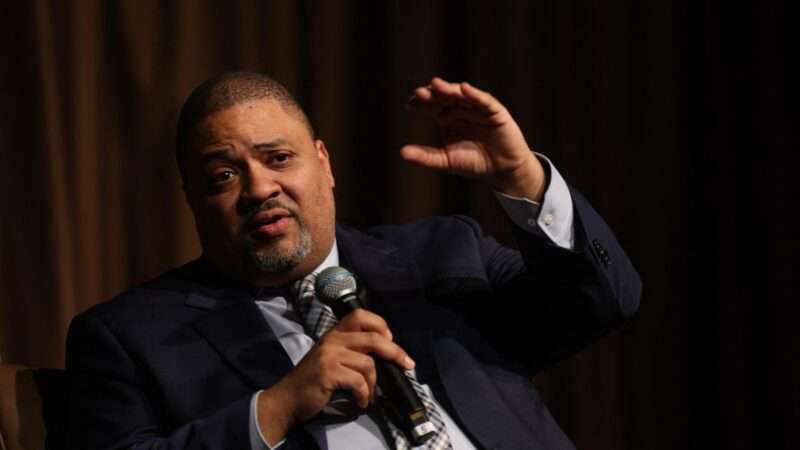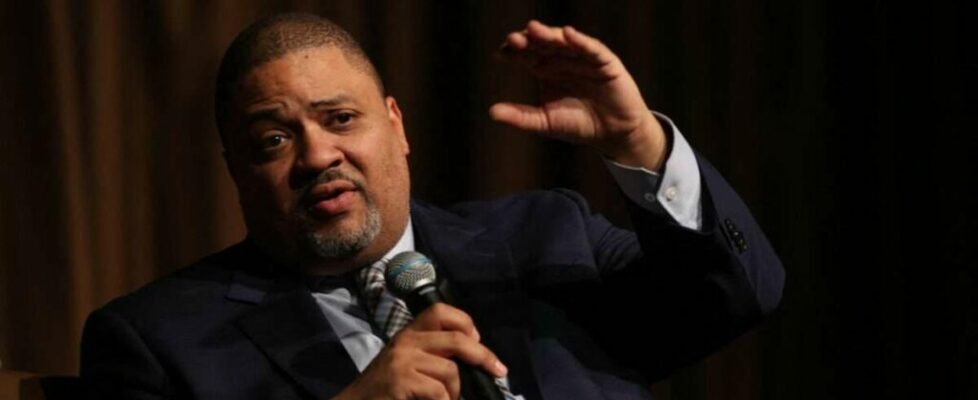Alvin Bragg’s Misbegotten ‘Election Interference’ Case Against Trump Ends With a Whimper

Unless the U.S. Supreme Court intervenes, President-elect Donald Trump will be sentenced on Friday for falsifying business records to cover up his 2016 hush payment to porn star Stormy Daniels. But although a New York jury convicted Trump of 34 felonies in that case last May, Judge Juan Merchan has indicated that he plans to impose “a sentence of unconditional discharge,” meaning Trump will face neither jail nor probation. Which makes you wonder: What was the point of prosecuting this case?
The point, it seems clear, was to undermine Trump’s prospects in the 2024 election by tarring him as a convicted felon—a status that Democrats emphasized in vainly trying to turn voters against him. But deploying that label required a dubious legal theory that aimed to punish Trump for conduct that was not inherently criminal.
As Manhattan District Attorney Alvin Bragg told it, he was holding Trump accountable for undermining democracy by persuading Daniels to keep quiet about her 2006 sexual encounter with him at a hotel in Lake Tahoe. “The heart of the case,” Bragg explained, is “about conspiring to corrupt a presidential election and then lying in New York business records to cover it up.” Bragg said the nondisclosure agreement (NDA) that Trump lawyer Michael Cohen arranged with Daniels amounted to “election interference” because it deprived voters of information they might have deemed relevant in choosing between Trump and Hillary Clinton in 2016. But trying to avoid bad press is not a crime, and Trump was not charged with “election interference.”
The records at the center of the case consisted of 11 invoices, 11 checks, and 12 ledger entries that prosecutors said falsely portrayed Trump’s reimbursement of Cohen’s payment to Daniels as compensation for legal services. To emphasize the gravity of Trump’s attempt to conceal embarrassing information, Bragg relied on several interacting statutes to convert falsification of business records, ordinarily a misdemeanor, into a felony. The difference hinged on whether Trump had falsified records with “an intent to commit another crime or to aid or conceal the commission thereof.”
Bragg was hazy on exactly what the other crime was, although he suggested that the Daniels NDA “violate[d] state and federal election laws.” One theory was that the $130,000 hush payment qualified as an excessive campaign contribution under federal law—a characterization that Cohen accepted in a 2018 plea agreement that also resolved several other, unrelated charges against him. But given the fuzziness of the distinction between personal and campaign expenditures, that interpretation was open to debate. This theory of “another crime” also relied on an obscure New York law that makes it a misdemeanor for “two or more persons” to “conspire to promote or prevent the election of any person to a public office by unlawful means.”
There were other possible theories, and the prosecution never definitively settled on one in particular. As if to make up for that lack of clarity, Bragg made his case seem more impressive by counting each of the 34 records as a distinct felony.
Bragg was undeterred by the fact that his predecessor, Cyrus R. Vance Jr., had decided against charging Trump with state crimes based on the Daniels NDA after concluding that none of the options was legally viable. Bragg was determined to get Trump one way or another. The resulting case was so vague, complicated, and confusing that it remains unclear exactly which version of Bragg’s theory the jurors accepted. But they apparently were swayed by the prosecution’s claim that Trump somehow had committed “election fraud,” even though he was never charged with that crime.
Post-verdict commentary by Democrats who welcomed Trump’s conviction echoed Bragg’s nonsensical spin on the case. “We allege falsification of business records to the end of keeping information away from the electorate,” Bragg said in a January 2024 interview with NY1. “It’s an election interference case.”
The dates of those business records ranged from February 14, 2017, to December 5, 2017. All of them were created after Trump was elected. It is logically impossible that records created in 2017 retroactively influenced the 2016 election.
Unfazed by that temporal difficulty, NPR reported that “former President Donald Trump has been found guilty of 34 counts of falsifying business records to influence the outcome of the 2016 presidential election.” A Washington Post editorial likewise asserted that the jury had found Trump “guilty of felony falsification of business records in order to influence the 2016 election.”
A New York Times editorial claimed Trump had been convicted of “falsifying business records to prevent voters from learning about a sexual encounter that he believed would have been politically damaging.” It said the verdict “establishes that Mr. Trump committed crimes in hiding pertinent information about himself from the American people for the purpose of influencing the 2016 presidential election.”
Harvard law professor Laurence Tribe approvingly quoted a similarly puzzling take on the verdict: “We now know Trump committed 34 felonies to win that election. Without these crimes, he seems almost certain to have lost to Hillary Clinton.” Rice University historian Douglas Brinkley said the jurors “have convicted former president Donald Trump on 34 counts of falsifying business records in an attempt to influence the outcome of the 2016 presidential election.”
None of this made any sense, but that did not matter. The point was that Clinton should have won the 2016 election. As Democrats saw it, she lost only because of Trump’s chicanery, which amounted to serious crimes that were rightly treated as felonies. That view conveniently dovetailed with the goal of stopping Trump from returning to the White House.
We know how that turned out. Trump plausibly portrayed the case as politically motivated, which reinforced his general complaint that Democrats were manipulating the law to prevent his election. Because this was the first and only criminal case against him to reach a jury, it probably made voters skeptical of the other, more credible charges against him, some of which alleged much more serious offenses. In any event, voters were demonstrably unfazed by Trump’s convictions.
Announced with a roar, Bragg’s case against Trump is ending with a whimper. “It seems proper at this juncture to make known the Court’s inclination to not impose any sentence of incarceration, a sentence authorized by the conviction but one the People concede they no longer view as a practicable recommendation,” Merchan wrote when he upheld Trump’s convictions last Friday. “A sentence of an unconditional discharge appears to be the most viable solution to ensure finality and allow Defendant to pursue his appellate options.”
Theoretically, Trump faced up to four years in prison, although a sentence of incarceration seemed unlikely even before he won the election. Now that Trump is about to be president again, Bragg will have to settle for no punishment at all, aside from a felony record that may yet be erased on appeal.
That does not mean Bragg accomplished nothing. His misbegotten case against Trump undermined the rule of law and public confidence in the criminal justice system while lending credence to Trump’s insistence that all of his legal troubles could be explained by partisan animosity. In Trump’s telling, it was Bragg who was guilty of “election interference,” and it is hard to disagree.
The post Alvin Bragg’s Misbegotten ‘Election Interference’ Case Against Trump Ends With a Whimper appeared first on Reason.com.
